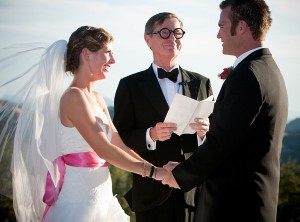How to Welcome Religious Guests At A Humanist Wedding

Summer is the season for weddings! Matthew Bulger, AHA legislative associate and new Humanist Celebrant, shares his recent experience of officiating a friend’s non-religious wedding and offers insight in making religious guests feel welcomed.
I recently had the pleasure of becoming a Humanist Celebrant (you can become one too!) after I was asked by some close friends to officiate their wedding this past June in Maryland. The wedding itself was beautiful and very well organized, and now that I’m a Celebrant I expect that I’ll be present at a few more weddings in the very near future.
What I liked so much about my friends’ humanist wedding was that it was focused on the joy of the couple and the coming together of two different groups of families and friends. Most of the people at the wedding came from different places and held many differing personal and religious beliefs, but everyone got along extremely well and enjoyed themselves.
The humanist elements of the ceremony was a way for the bride and groom to give some insight to those assembled into the shared beliefs that inspired and guided the couple throughout life. Concepts like love, respect, compassion, and empathy were emphasized, as was a sense of wonderment at the world we all inhabit.
The service, while non-religious, was therefore accessible to people of all different faiths and of no faith, and hopefully left those assembled with a feeling of connection to the community. What the service didn’t do was take unnecessary potshots at religion or those who believe in a god, and that made all the difference in making the ceremony feel truly open and loving.
Unfortunately, serene weddings like the one I attended aren’t always that easy to pull off. Sometimes, religious guests at weddings can be quite offended by non-traditional ceremonies, and non-believers themselves sometimes stoop to explicitly insulting religious beliefs in their wedding ceremonies even with religious guests present.
That’s why I think it is so important to share four easy rules with those who plan on having a humanist or non-religious wedding that will be attended by religious guests. Hopefully, by following these rules, couples will be able to speak about their beliefs in a way that is both powerful and accessible to all.
1. During your ceremony speak about what you do believe. Instead of emphasizing how you and your partner thought religion was wrong/silly/immoral, speak about how you both place a heavy emphasis on ethics and doing right by others and the community. Emphasize positive humanist values instead of making negative statements.
2. Refrain from religious mockery. That means not having your officiant dress up like a faux-priest or other religious figure, or making explicitly mean religious jokes during the ceremony or reception speeches.
3. Inform your guests early on that the service will be a humanist or non-religious one. Sometimes, people just need time to acclimate themselves to a new concept, and might actually find after some research that they agree with some of the non-religious beliefs of the officiant or couple.
4. Be smart with your seating assignments. You should try to mix religious and non-religious guests to foster discussion and expose people to new ideas, but know which of your guests are either too religious or atheistic to sit with someone of drastically different beliefs. Basically, don’t put your evangelical great-grandmother who was married to a born-again pastor next to your college buddy who is an especially unapologetic anti-theist.
Keep in mind that even the most conscientious host will occasionally have guests that cause trouble no matter how respectful and accommodating people are to them. While I might advise against inviting these particularly antagonistic people to a gathering such as a wedding, I understand that this might not always be possible. For these cases I can only recommend that the hosts take time to speak with the person before the wedding about the content of the service while explaining that it is expected of them to be well-behaved during the ceremony.
Remember, weddings are at their core about joining people together, and the message of the ceremony plays a big part in that effort. The right words can make a family weep and friends hug, but it can also damage a relationship or ruin an otherwise beautiful day. My advice is that couples pick their words wisely so that they celebrate rather than distract from the beginning of a new stage in life.
